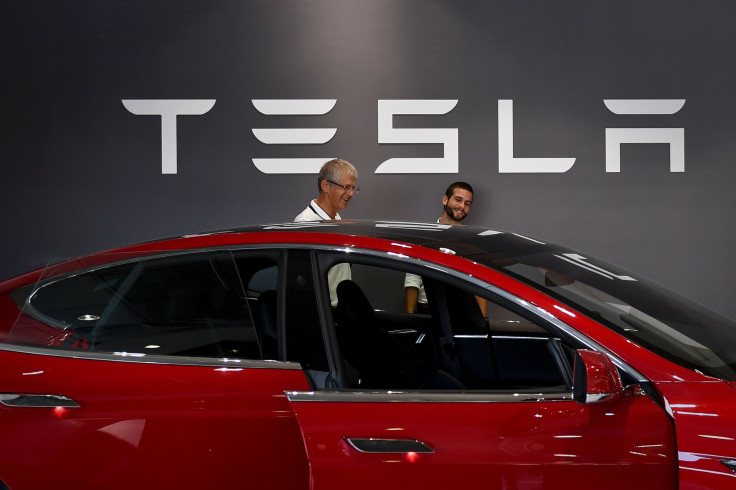Is Tesla Stock A Buy? Elon Musk's Electric-Car Maker Bas Big Plans But Can It Outperform?

Everybody's talking about Tesla (NASDAQ:TSLA). As usual.
The carmaker can't go a few days without being in the news for something. When I started writing this article, it was the story that Tesla has lost a $5 million Model 3 order from a German car rental company over defective equipment. By the time I finished, it was Walmart's lawsuit against Tesla for defective solar panels. By the time this article is published, I won't be surprised if some other piece of Tesla news is splashed across the front pages.
With all the nonstop coverage of Tesla's ups and downs, it can be tough to get a sense of the larger picture at the electric-car maker. Let's dig a little deeper to see whether Tesla is a buy.
More cars, less revenue
One of the biggest contrasts in Tesla's raw numbers was on display in the company's Q2 earnings report. Tesla delivered a record number of cars during the quarter, reporting 95,356 vehicle deliveries. That was a 134% increase over Q2 2018 and a 4.8% increase over its prior record, set in Q4 2018. The company is confident that the cost per vehicle of the Model 3 will continue to decline as production increases, which is critical for Tesla's financial success.
However, despite delivering more vehicles than in Q4 2018, the company's revenue was down 11.9% from that quarter. That's because the company is selling fewer of its more expensive models, the Model S and Model X. The company is also making less profit per vehicle, because the Model S and Model X sport higher margins than the cheaper Model 3.
The good news is that Tesla seems to be successfully executing its initial long-term strategy of starting with a high-end luxury sports car (the Roadster) to raise interest and initial capital while gradually offering lower- and lower-priced vehicles to appeal to the mass market. The bad news is that this strategy might not be paying off for investors.
Funding the plan
If Tesla were a mature car company that only had to worry about building cars in existing assembly plants and selling them through established sales channels, that would be one thing. Unfortunately (or, maybe, fortunately), that's not Tesla.
Tesla is still a fledgling manufacturer. Even though its Gigafactory is now online and churning out vehicles, the company is still in high-growth mode. It's spending money developing a Model Y crossover SUV and a Tesla pickup truck and building a factory in China to avoid Chinese tariffs and hopefully make inroads into the lucrative Chinese market. It's also trying to sell more of its cars (and solar and battery products) while simultaneously closing Tesla stores to cut costs.
That's a lot for one company, and it's why Tesla has only managed to turn a quarterly profit three times in the last five years. Meanwhile, the company has continued to add to its debt load, which recently surpassed $13 billion, nearly one-third of its current market cap. Tesla's valuation metrics are way out of whack with the rest of the auto industry, and there are very real concerns that the company is on an unsustainable financial path.
That path may only get harder to climb as we head into 2020.
The only game in town
Tesla has benefited from being one of the first manufacturers to offer all-electric vehicles to U.S. consumers, particularly sedans and the mid-size Model X SUV. By contrast, most of the all-electric competition in the U.S. up to this point -- including General Motors' Chevy Bolt and Nissan's Leaf -- has consisted of compact or subcompact hatchbacks. That's about to change, though.
Several of Tesla's competitors have electric vehicles set to launch in 2020. Ford will roll out an all-electric crossover SUV based on its iconic Mustang next year. Audi and Porsche are working on all-electric "super sedans" rumored to begin production in late 2020 as well. Tesla's brand is certainly valuable and a status symbol in a way that Chevrolet and Nissan aren't...but Mustang, Audi, and Porsche might be able to hold their own against Tesla in a battle of the brands, especially given the fact that Tesla's advertising budget is minimal.
Given the shift in Tesla's sales toward the Model 3, it appears that consumers didn't necessarily want a Model X or S; they wanted a Tesla. Soon, though, we'll see whether consumers actually want a Tesla or just an electric sedan or SUV. And you can bet that Ford's, Audi's, and Porsche's robust and well-funded marketing departments will try to convince them of that.
What it means for investors
In a recent episode of the Motley Fool's Industry Focus podcast, my colleague Nick Sciple had this to say about Tesla's autonomous driving ambitions: "From the information I've been able to see, I believe that it's very much a long shot. But, if it works out, it is a massive, massive opportunity. We'll just have to see."
That sentiment could be applied to Tesla in general. The whole company has been a massive long shot from the get-go and has overcome numerous challenges to get where it is today. But it's far from clear if the company's current strategy and financial situation are sustainable, especially as competition gets fiercer, margins get slimmer, and the company's debt continues to climb.
Given all that, Tesla just looks too risky right now to call it a buy.
John Bromels owns shares of Ford and Tesla. The Motley Fool owns shares of and recommends Tesla. The Motley Fool has a disclosure policy. This article originally appeared in the Motley Fool.





















